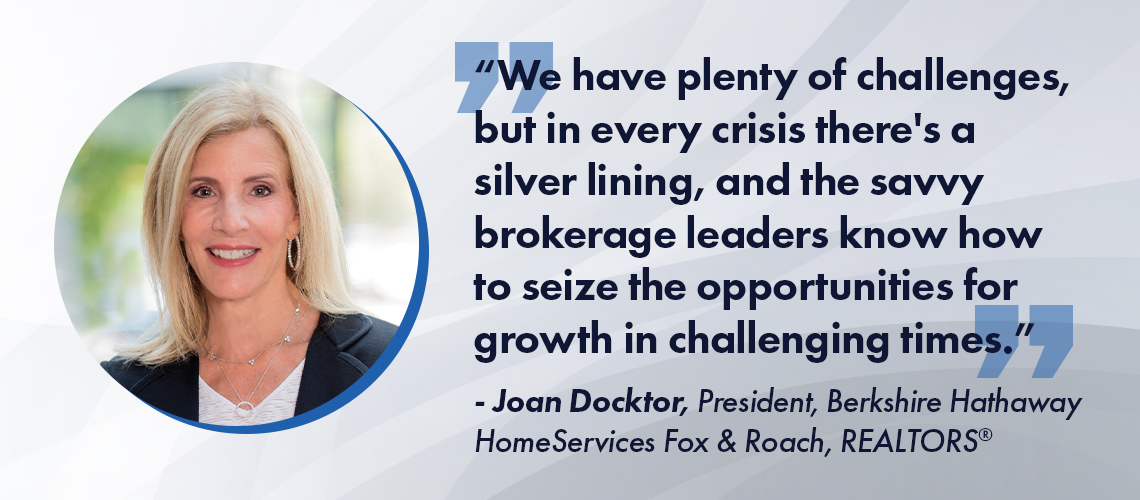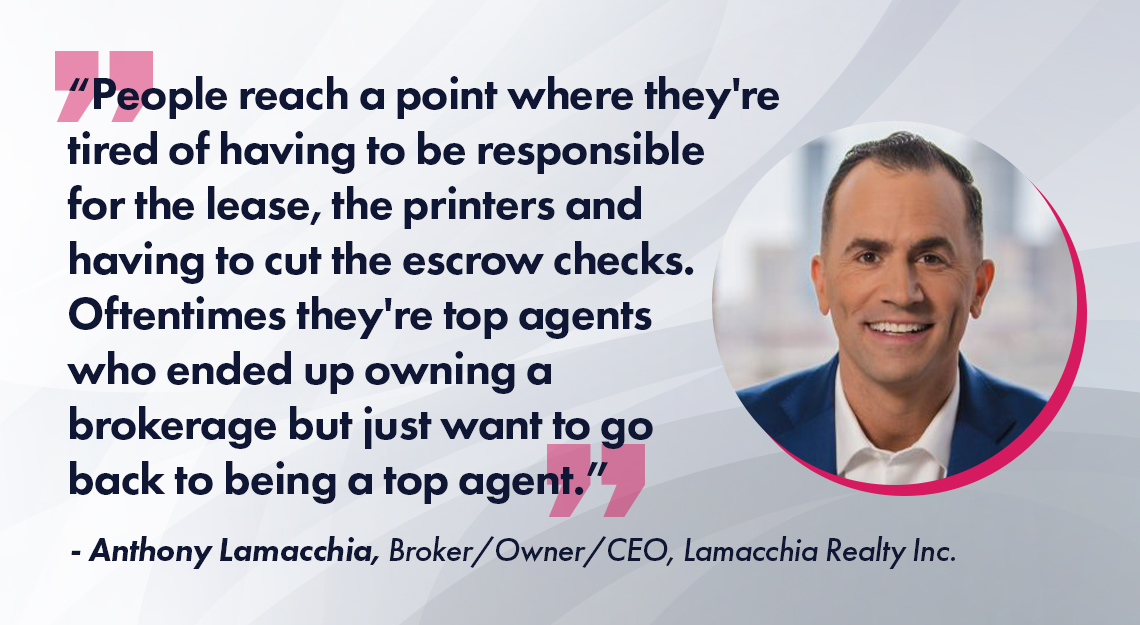
Above Left to Right: Joan Docktor, DeAnn Golden, Anthony Lamacchia, Liz Nunan
From rising interest rates and inflation to the persistent lack of inventory, today’s challenging real estate market can make growth seem out of reach for brokers who are just trying to keep their heads above water. But every crisis has a silver lining, and brokerage leaders know how to seize opportunities for growth in challenging times. Having the right strategies for mergers, acquisitions, roll-ins, agent expansion and more is crucial.
As the 2023 market heats up with the weather, brokers have been through about a third of the year, and can gauge whether the goals they set late last year are being realized, and if not, what they need to do to make them happen.
“We have plenty of challenges, but in every crisis there’s a silver lining, and the savvy brokerage leaders know how to seize the opportunities for growth in challenging times,” says Joan Docktor, president of Berkshire Hathaway HomeServices Fox & Roach, REALTORS® in Devon, Pennsylvania. “Anyone who has been in residential real estate for a number of years knows our business is cyclical, and that great brokers often grow in these times, and also grow their marketshare.”
For DeAnn Golden, president and CEO of Berkshire Hathaway HomeServices Georgia Properties in Atlanta, Georgia, 2022 was a year to recalibrate after years of dizzying sales volume.
“We view the past two years as abnormal,” she says. “Recruiting continues to be very strong. We’re bringing in well over 350 associates a year, with an intentional focus on those who will thrive and go through this next cyclical market phase and be there for their clients.
“It has also opened up opportunities for acquisitions, as many are looking at where their business will be over the next year, two years or three years, and may have been looking for a plan B, particularly smaller companies with a leader looking to decide on their next chapter,” she adds.

Adding new agents has never been an issue for Anthony Lamacchia, broker/owner/CEO of Lamacchia Realty Inc. in Waltham, Massachusetts, but acquisitions didn’t happen last year. He’s hoping they will this year.
“One of the things that I’m proud of in 2022 is we did a much better job recruiting top agents,” he reports. “But I wasn’t particularly happy with acquisitions. We weren’t looking to acquire anyone from about the spring of 2021 until the summer of 2022, when I knew the market had changed. I thought by now that I’d be able to report an acquisition or two. I expect this year to be a lot better for acquisitions. We’re operationally and financially ready, willing and able to acquire other companies.”
Time to Grow Again
Brokerages looking for acquisitions this year is a common theme as the market looks to rebound, with mortgage rates seeming to stabilize under 7% and inventory starting to open up in many parts of the country.
Liz Nunan, president and CEO of Houlihan Lawrence in New York City, shares that her company had a specific goal, one which it has met and is continuing to exceed.
“At the end of 2021, in a company-wide email, I let everybody know that my focus word for 2022 was going to be growth,” she explains. “We started 2022 bringing on a licensed affiliate with five offices, extending our reach. A couple of months after that we made an acquisition of another company that added two more offices for us. Last December, we added a team of 20 agents from a brokerage that was looking for a company to partner with that could provide them with more tools and support to help take their business to the next level. And basically we’re looking to do the same this year.”
Docktor makes the point that it can sometimes be problematic for employees when they’re part of a brokerage that is acquired, since they’re used to doing things a certain way and may worry about having to change to another company’s style, technology and more. And the brokerages may also be wary.
“When we look at acquisitions, brokers are often reluctant to be acquired, wanting to control their own destiny,” she says. “They don’t want an outsider telling them what to do. And there are some good reasons.”
Nunan accepts that logic, but counters that the competitive landscape has changed, and the companies that joined last year were looking to compete on another plateau.
“They wanted to be able to offer their agents tools and services that they frankly didn’t have access to on their own, and they wanted to be able to take their business to the next level,” she says. “In one case, the owners no longer wanted to be burdened by managing the day-to-day, and so that was a win-win.”
Doing everything possible to ensure that their top agents know the company is looking to grow has been a strategy Golden promotes.
“To us, retention is No. 1, but also being a company in growth mode, because that’s what top producers want to be with,” she says. “We got very intentional with our managers and asked them each to identify two or three companies, like-minded and like-culture, with productive agents they felt would be a great fit to be a part of us.
“What that led to was some incredible meetings to be able to start those conversations,” says Golden. “We looked at where they were in their life cycle of running a company, and many of them had gone from being an agent to a broker to an owner, and maybe somewhere along the way they really did enjoy being that rainmaker and that sales professional that attracted the talent, and wanted to go back to that. You’ve got to be intentional with this type of growth, and then you’ve got to ensure that it’s like-minded and a good fit for your culture for it to work.”

Overcoming owner concerns when trying to acquire a brokerage can be a slippery slope. Lamacchia also agrees that it’s often owners seeking less pressure who are most likely to sell their businesses.
“People reach a point, particularly those that don’t scale their businesses, where they’re tired of having to be responsible for the lease, the printers, having to cut the escrow checks, and oftentimes, they’re top agents who ended up owning a brokerage but just want to go back to being a top agent,” he says. “Taking those stresses off of them and enabling them to go back to doing what most are very good at in the first place, which is selling homes and working with lots of clients, is usually the best angle.
“Often, these folks with the smaller brokerages are people who were very good at selling homes, but they ended up owning a brokerage and realize that it is a little more complicated than it looks,” he adds. “Suddenly, they’re not selling as many homes and have agents leaving. I would compare it to being a very good basketball player who becomes a coach. It doesn’t mean they’re going to be a good coach just because they were a good player.”
Agent-Recruiting Strategies
“We all know how important individual recruiting is, and we know that if a company is not growing, it’s shrinking because there’s attrition,” says Docktor. “People move away and some get recruited away. As the National Association of REALTORS® reports, the average agent stays with the same company for only five years. So new-agent recruiting is important, and especially seasoned-agent recruiting, because when you recruit a seasoned agent, you have business coming in the door immediately. When you have a new agent, it takes a little time for them to get up and running.”
Ensuring that recruited agents, whether new or seasoned, are able to seamlessly mesh with the staff already at the brokerage, and are aligned with your goals, are probably the most important qualities to vet. Docktor lists questions that must be answered by brokerages when seeking new hires.
- What requirements, if any, do you have of the seasoned agents that you bring in, and do your sales leaders have recruiting goals?
- How do you make sure they’re aligned with your goals, especially when some of them prefer to not make recruiting calls?
- How do you get them engaged?
- Do you compensate them separately for recruiting, and if so, is it a substantial part of their compensation?
- How do you assist them? How do you help them get over these hurdles?
Lamacchia says that new agent recruits to his agency must be willing to do one thing above all else: work hard.
“I talk to agents every day of my life, seven days a week, agents in and out of the company,” he says. “I focus on recruiting top agents and team leaders. I started looking around last spring and said we have too many agents that are new and not trying as hard or are as committed as they should be. And we came out with Commitment to Success, which is 11 line items agents have to agree to in order to be a part of the company. And when we did that, we were able to shake out about 45 agents.
“We were able to get the team refocused. And as far as our recruiting goes, we don’t have a traditional setup. We have a business development department and all they focus on is recruiting. There’s a director, a manager and business development consultants. That model has worked out well for us,” he adds.
Nunan cites a legendary hockey player’s quote when explaining how her brokerage approaches the recruiting game.
“We have so many agents who’ve been with us for 10-, 20-, 30-plus years. In fact, many of our recruits are recommended by current Houlihan agents that they’ve worked with, who they thought would be good additions to our team,” she says. “We all remember the days when you didn’t have to recruit. Agents just came to you because they wanted to be with the market leader. But it’s different now, and making recruiting calls is part of the business.
“If you think about it, it’s not that difficult,” says Nunan. “Wayne Gretzky once said you miss 100% of the shots that you don’t take. It’s a simple phone call. They’re just people, and what’s the worst that can happen? They say ‘no thanks, I’m happy where I am.’ Or perhaps they say ‘wow, I never thought a company like yours would be interested in me. I’d be happy to meet you.’ You just never know.”



